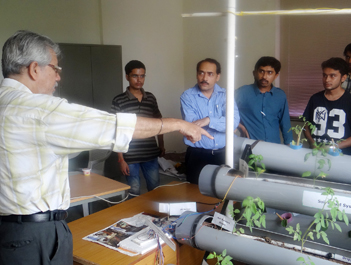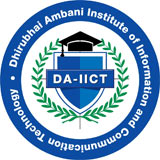 The M.Sc. (Agriculture Analytics) is Jointly offered by DA-IICT, Anand Agriculture University and Indian Institute of Remote Sensing (IIRS, Dehradun) with active participation of Industries by offering value added courses. It is a two-year (Four semesters) postgraduate program and the degree will be offered by DA-IICT, Gandhinagar.
The M.Sc. (Agriculture Analytics) is Jointly offered by DA-IICT, Anand Agriculture University and Indian Institute of Remote Sensing (IIRS, Dehradun) with active participation of Industries by offering value added courses. It is a two-year (Four semesters) postgraduate program and the degree will be offered by DA-IICT, Gandhinagar.
The program is aimed at nurturing students, with insights and the know-how to take the sector into the future. This is a multidisciplinary program of agriculture and data analytics. The course will introduce students to concepts of data analytics, viz. descriptive, predictive and prescriptive, in agriculture and will empower the students to eliminate speculative farming and usher in the age of predictive agriculture.
A unique feature of this program is introduction of value added courses to be offered by industries. The courses allow certification by the industries after successful completion of the tests. The courses offered in the program consists of two categories – domain and technology specific areas. The coverage of Domain specific courses includes Crop Yield Modeling by SATSURE Analytics, Enhanced Weather Forecasting by IBM India, Spatial Analysis with ArcGIS Pro by ESRI India, AI in Agritechnology Business by AMNEX Info Technologies. The technology specific courses are Visualisation and Story Telling tools by Analytics Vidhya, Microwave Data Processing by SATSURE Analytics.
Programme Outcomes (POs)
| PO No. | Programme Outcomes Upon completion of the M.Sc (AA) Programme, the graduate will be able to |
|---|---|
| PO1 | Engineering knowledge: Apply the knowledge of mathematics, science, engineering fundamentals, and an engineering specialization to the solution of complex engineering problems. |
| PO2 | Problem analysis: Identify, formulate, review research literature, and analyze complex engineering problems reaching substantiated conclusions using first principles of mathematics, natural sciences, and engineering sciences |
| PO3 | Design/development of solutions: Design solutions for complex engineering problems and design system components or processes that meet the specified needs with appropriate consideration for the public health and safety, and the cultural, societal, and environmental considerations. |
| PO4 | Conduct investigations of complex problems: Use research-based knowledge and research methods including design of experiments, analysis and interpretation of data, and synthesis of the information to provide valid conclusions. |
| PO5 | Modern tool usage: Create, select, and apply appropriate techniques, resources, and modern engineering and IT tools including prediction and modeling to complex engineering activities with an understanding of the limitations. |
| PO6 | The engineer and society: Apply reasoning informed by the contextual knowledge to assess societal, health, safety, legal and cultural issues and the consequent responsibilities relevant to the professional engineering practice. |
| PO7 | Environment and sustainability: Understand the impact of the professional engineering solutions in societal and environmental contexts, and demonstrate the knowledge of, and need for sustainable development. |
| PO8 | Ethics: Apply ethical principles and commit to professional ethics and responsibilities and norms of the engineering practice. |
| PO9 | Individual and team work: Function effectively as an individual, and as a member or leader in diverse teams, and in multidisciplinary settings. |
| PO10 | Communication: Communicate effectively on complex engineering activities with the engineering community and with society at large, such as, being able to comprehend and write effective reports and design documentation, make effective presentations, and give and receive clear instructions. |
| PO11 | Project management and finance: Demonstrate knowledge and understanding of the engineering and management principles and apply these to one’s own work, as a member and leader in a team, to manage projects and in multidisciplinary environments. |
| PO12 | Life-long learning: Recognize the need for, and have the preparation and ability to engage in independent and life-long learning in the broadest context of technological change. |
Programme Specific Outcomes (POs)
| PSO No. | Programme Specific Outcomes (PSOs) |
|---|---|
| PSO1 | To address agriculture problems by applying mathematical concepts and solving real-world problems using algorithmic techniques. |
| PSO2 | To apply the mathematical and earth science approaches for analyzing, designing and development of agriculture model and analytics. |
| PSO3 | To work as a socially responsible professional by visualizing and solving problems in agriculture. |
Program Outcomes (POs) & Course Outcomes (COs) of The Program
Semester-wise Program Structure
The M.Sc. Agriculture Analytics Program follows a full time four-semester pattern and the curriculum consists of three semesters of course work followed by a one-semester project/research work on a specified topic. During Summer semester, Value Added Courses (VAC) will be organized at DAIICT by the Industries. The VAC comes with certification after successful completion.
| Course Name | Credits (L-T-P-C) |
|---|---|
| Python Programming and Database with SQL | 3-0-2-4 |
| Analytics / Statistical methods | 3-0-2-4 |
| Earth Observations (EO) System | 3-0-2-4 |
| Preparatory Mathematics / Basics of Agricultural Science | 2-0-0-2 |
| Course Name | Credits (L-T-P-C) |
|---|---|
| Programming for Geodata Processing | 2-0-4-4 |
| Big Data Analytics | 2-0-4-4 |
| Machine Learning | 2-0-4-4 |
| Spatial Modeling and Data Assimilation | 2-0-4-4 |
Value Added Courses – 8 Credits (tentative)
| Course Name | Credits (L-T-P-C) |
|---|---|
| Crop and Soil Analytics | 3-0-2-4 |
| Weather and water analytics | 3-0-2-4 |
| Agricultural Market Analytics | 3-0-2-4 |
| Risk Analysis and Modelling | 3-0-2-4 |
Projects / Industrial Internship
Admission Process
Details on the application process, admission criteria, fee structure and financial assistance can be found here

